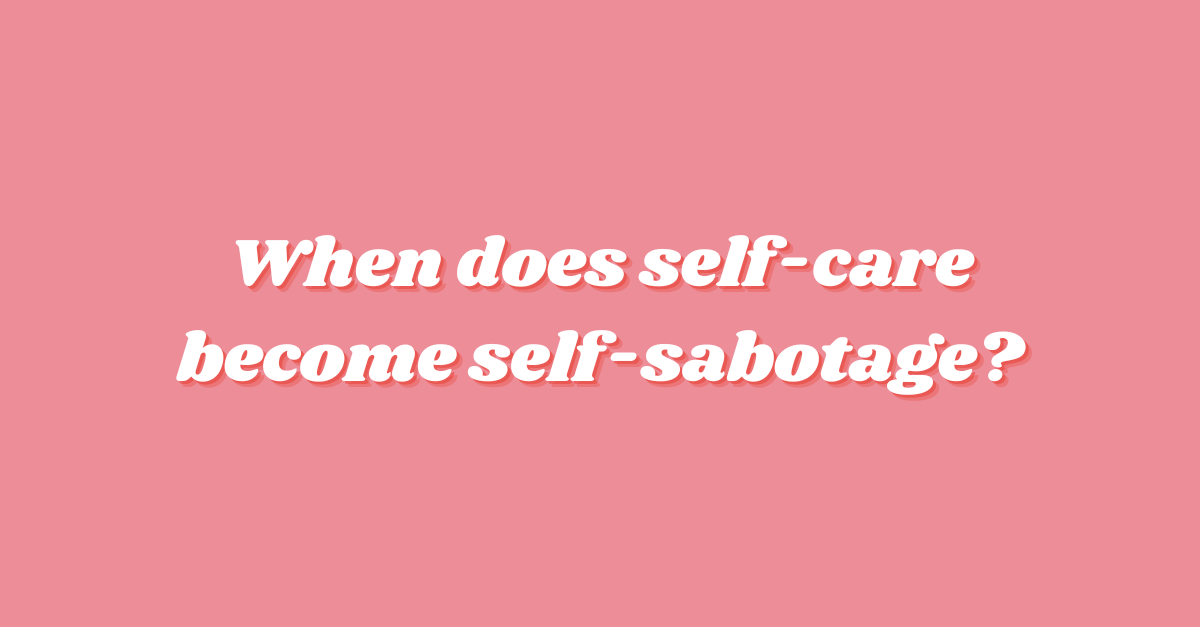The latest Tik Tok trend doing the rounds? A concept called “bed rotting” (whatever next, right?).
If you’re wondering what the hell that is, a content creator called Vanessa Hill sums it up as “When you do literally nothing but laying in bed. It is the end of optimisation.”
Bed rotting has taken off as an anti-hustle-culture act of self-care, but essentially it’s a rebrand of the “duvet day”. The idea is that you give yourself permission to lie in bed, watching Netflix, eating snacks, or doing “literally nothing” as an antidote to our fast-paced lifestyles, and a chance to restore and recharge.
Psychologists have been quick to point out that the drawbacks of “bed rotting’, such as poor sleep hygiene. But the trend also got us thinking about how complex the topic of self-care can be…
Is bed rotting self-care or self-sabotage?
While rest and recuperation can sometimes be just what we need, there’s something about “rotting” that doesn’t exactly sound healthy. Bed rotting is a response to pressures and anxieties of modern life—but is it an act of resistance or is it simply…hiding?
While the answer will differ from person to person, the real question is this: is it self-care or or is it self-sabotage? To properly look after yourself, it’s crucial to understand the difference. So let’s take a look at what that is and where to draw the line.
What is self-care?
In recent years, self-care has been monetised by the wellness industry, meaning it’s now commonly misrepresented as matcha lattes, skincare products and expensive candles. But when we go back to its roots, it self-care means something very different.
While the term first started appearing in the medical community in the 1950s, it was the Black Panther Party that popularised self-care during the 60s and 70s. They promoted self-care as a vital tactic in protecting the needs of Black communities and activists. Black, queer women, in particular, were instrumental in developing the self-care movement.
At its core, self-care refers to intentional actions and practices that prioritise your physical, mental, and emotional wellbeing. It involves activities that nurture and restore your energy levels, reduce stress, and enhance your overall quality of life.
Whether that’s a gym routine, nourishing food, a meditation practice or simply getting an early night, self-care is a proactive approach to maintaining balance and preventing burnout (that’s why it was so essential to activists on the frontlines of the civil rights movement).
What is self-sabotage?
We’ve touched on self-sabotage in our recent posts on perfectionism, the fear of success and the mother wound.
Self-sabotage is any unconscious or conscious behaviours, actions, or thoughts that hinder your personal growth and wellbeing. For example, behaviours that undermine your progress or goals, often due to deeply rooted beliefs, fear of failure, or feelings of unworthiness.
It can manifest in various ways, such as procrastination, self-doubt, self-destructive habits, and (you guessed it) a loud inner critic that hogs a lot of your headspace.
Why do we get self-care and self-sabotage confused?
When you think about it, self-care and self-sabotage want the same thing: to protect you. That’s why the line between the two can become so blurred.
“Indulgent” activities, like drinking alcohol, are a good example. A glass of wine could be considered self-care if it brings you joy or relaxes you. But if that becomes one too many glasses of wine, day in day out, it becomes unhealthy and unhelpful for your overall wellbeing.
Anything that becomes excessive and starts to negatively impact your physical health, your self-esteem, your work or your relationships can be a form of self-sabotage.
How to distinguish between self-care and self-sabotage
Trying to distinguish between self-care and self-sabotage can actually be really tricky.
Let’s say you’ve had a draining week at work and feel like cancelling all your plans to do some bed rotting. It might genuinely do you some good to have the downtime and not over-exert yourself. On the other hand, seeing your mates could be the pick-me-up you need, and spending a whole day with the curtains drawn scrolling on Tik Tok could make you feel worse.
The key is to consider:
a) The underlying motivations.
b) The long-term effects.
i.e. is your underlying motivation coming from a place of self-compassion and acceptance (“I recognise that I’m almost at breaking point”) or is it coming from a place of low self-esteem or apathy (“I’ll be no fun at the party”, “I just can’t be bothered”).
Still struggling?! That’s totally normal. Sometimes, it’s really hard to sift through all our drivers and emotions.
Here are some key tips to help you:
Check in with your intentions. Are you drawing from your inner kindness or is your inner critic running the show? If you detect any feelings of fear, self-doubt or discomfort, it might be the latter.
Think through the impact. Self-care activities generally have a positive, nourishing effect on our mental, emotional, and physical wellbeing. They leave us feeling rejuvenated, energised, and more resilient. Self-sabotage, on the other hand, has detrimental effects, hindering progress and perpetuating negative cycles. What will be the outcome of your behaviour?
Practice developing self-awareness. We don’t learn how to distinguish between self-care and self-sabotage overnight—it takes practice. So try to make a habit of paying attention to the thoughts, emotions, and motivations behind your actions. Reflect on whether your choices align with your long-term goals and values (journaling can help here).
Find balance. Self-care is all about finding a balance—recognising when to prioritise rest and rejuvenation vs. when to take action and push through challenges. Remember that self-sabotage often leads to imbalance.
Ask yourself if it will lead to growth or stagnation. Self-care supports personal growth and self-improvement. Time to rest can be the foundation and preparation to stepping outside of your comfort zone and pursuing your goals. Whereas self-sabotage might hold you back, creating barriers to your progress and limiting your potential.
Learning to differentiate between self-care and self-sabotage is a big step in cultivating a healthy relationship with yourself. It all starts with self-awareness; when you understand the motivations behind your actions and think through the consequences, you can make informed choices that support your wellbeing and personal growth.
Over to you
What do you think of “bed rotting”? Do you sometimes struggle to tell the difference between self-care and self-sabotage? We’d love to hear your thoughts and experiences in the comments.






